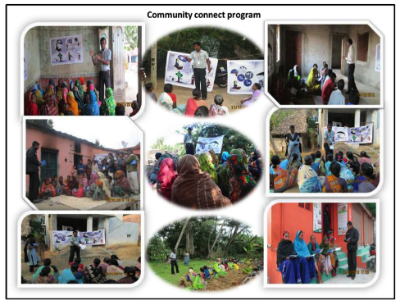Guest post by Karuna Krishnaswamy and Amit Arora, Rural Financial Institutions Programme, GIZ
In recent years there has been rising interest among financial service providers, NGOs and policymakers in educating customers and potential customers to enable them to make informed decisions on taking up and using financial products. There is a view that knowledge gaps prevent optimal take-up and usage of financial products by the poor and that behavioural change could be effected by imparting appropriate education.
SEBI, RBI and NABARD have taken up the mandate to facilitate provisioning of financial education programmes and have issued enabling regulations. The Financial Stability and Development Council, set up by the Government of India, has come out with a ‘National Strategy on Financial Education’. The strategy recommends that product education should be provider-neutral and that the responsibility of educating the buyer about the suitability of the product should rest with the seller. In terms of policy, the new government is proposing that banks be mandated to open two savings account per household and that account holders undergo financial education training before they can avail of the credit facility. This implies potentially huge numbers of people to be trained in the next few years.
However, in spite of many years of efforts in consumer education and a trend of institutions increasing commitment to this cause, many questions still remain unanswered.
For one, it is unclear whether existing education efforts have brought about any substantive behavioural changes. A review of the global literature on the evaluation of financial education interventions reveals mixed results in terms of impact1. In India, although Calderone et al. (2014) found that financial education altered attitudes and increased amounts saved in Basic Savings Bank Deposit Accounts, there are few completed impact studies, especially where there is a bouquet of financial products on offer for the customer to exercise her choice if her behaviour has been influenced.
Secondly, existing interventions range all the way from short duration mass audience programmes to more expensive classroom courses and one-on-one interactions with the cost varying from less than INR 60 to INR 1500 per participant. It is unclear whether the benefits outweigh the costs and what the optimal mode of delivery is.
Thirdly, in NABARD’s and RBI’s FLC efforts, is there client value and a business case for a generic financial awareness counselling programme that does not endorse specific products as espoused by the regulator? If so, who should conduct the intervention – the financial service provider, a neutral organization or through a public-private partnership with the state? Who should pay for it? How can the considerable corpus of NABARD, RBI (Depositor Education and Awareness Fund), SEBI, the stock exchanges and other donor agencies be best utilized?
In a unique PPP, GIZ’s Rural Financial Institutions Programme (RFIP) partnered with IFMR Rural Channels (IRCS) through its Kshetriya Gramin Financial Services (KGFS) network on the ‘Master Trainer’ project, to answer some of these questions. While the evaluation is not completed, this post shares some early experiences.
The hypothesis
The hypothesis was that it would be feasible for a commercial financial services provider to conduct a product-neutral financial education programme with the intention of raising financial awareness in a sustained manner.
The intervention
Phase 1 of the project ran from October 2012 through 2013. The intervention consisted of a 45 minute presentation called the Community Connect Program (CCP). The CCPs are conducted by Master Trainers, handpicked, highly motivated and charismatic staff from the KGFS branches. They are not given incentives or business targets. They conducted the program for groups of 10 to 25 (largely) women in the villages.
IRCS found that a 45 minute presentation may not be sufficient to alter customer behaviour and that people still had a number of operational questions before they could translate interest into an informed decision to avail an appropriate product. Hence in Phase 2 in 2014, after the CCP, the Master Trainer started conducting individual household follow-up visits for those attendees that expressed interest in a particular product. The Master Trainer comes prepared to answer questions and to make suitable recommendations.
The CCP concept
The Master Trainer starts a CCP by clarifying that he is not here to sell products but to help them achieve their lives’ goals. He gets the audience to think about their households’ goals and how they would meet them, common risks that they face such as the death or unexpected loss of income of an earning member, coping with expense shocks and preparing for retirement in dignity. The Master Trainer then proceeds to discuss some of the mistakes they commit and provides simple suggestions such as:
- Having clarity on monthly income and expenses
- Using all available assets
- Reducing unnecessary expenses
- Not borrowing more than is needed
None of these ideas is unfamiliar to the audience, but it is not uncommon for a person living in economic uncertainty to turn a blind eye to her peccadilloes. The messages resonate well with some of the attendees because he has raised the salience of the risks, worries, inefficient practices and uncertainties that they face to the fore. As one participant said to us, “We were all blind then; at least we are awake to our issues now”.
The Master Trainer proceeds to suggest how using financial products such as taking insurance to protect income flows from disruptions due to perils and saving in a pension product could help. He also provides practical advice on implementing changes such as tips on comparing flat and declining interest rates in order to compare loans and hands out an accounts book. He then leaves without actively endorsing any products.
After this brief intervention, the audience may be none the wiser in terms of product literacy. They may not understand all the terms of an insurance or a pension product or how to compare a flat interest loan from a moneylender with KGFS’ declining rate loans. However, they trust that the Master Trainer’s advice is not motivated solely by sales interests and some are happy to try out the product after taking his help in figuring out operational questions such as:
- Can they take policy on their spouse’s name?
- What company should they take a policy from?
- What amount should they insure themselves for?
- What documents are needed for a loan application?
It helps that among the previously enrolled members (those whose financial profile has been assessed at the branch), both KGFS and the Master trainer are familiar to the audience. KGFS believes that the CCP helps to prepare the ground for sale of suitable financial services to customers in a one-on-one setting.
The CCP has reached out to more than 18,000 people, largely women, over the past 16 months.

Client feedback
A qualitative evaluation that GIZ conducted suggests that in the case of some of the participants, the concepts presented by the Master Trainer have been well received and implemented. Some illustrative anecdotes:
Saving and interest rates
“I am not literate but I want my children to have quality education and hence send them to a private school. The fees are high and I usually take a loan from my land owner. Now I understand I can plan and save through the year in regular instalments (recurring deposit). Not only do I save on the interest (paid to the moneylender), I earn an additional 4% interest on my deposits.” – Participant from Vellaaru.
Planning
“My husband is a cab driver besides being a farmer. He will make more money if we could invest in a second-hand car. I am going to discuss with the Wealth Manager to explore the possibility to take a loan if this will fall under ‘grow concept’. We have identified our goals, both individual and household, developed a business plan for us to purchase a vehicle of our own and thereafter expanding into a cab service with 5 – 6 cars in a few years.” – Member from Vellaaru
Financial diaries
“The financial diary will be very useful if we fill it regularly. It will help us understand how and on what our money is spent. I want to show my husband how much money he wastes because of his drinking habit. I don’t know the exact amount he spends as he usually keeps a certain portion of the money with him and gives me the balance for household expenses. I am going to ask my husband to fill this diary so he knows how much he is spending at the wine shop.” – A participant in Pudhuaaru.
Insurance against risks
Insurance expectedly was the most complicated concept to understand while pension was easier.
“I know a bit about loans but I did not know that I can plan for my future through the pension scheme and don’t have to depend on my children during my old age. Also, the insurance scheme for accidents will be very useful as most of the men folk in our community travel long distances on two wheelers and is fairly dangerous as we have too many trucks passing through these roads at high speed. A neighbour lost her son and their family could have benefited had they been insured.” – Enrolled customer from Vellaaru.
More details of the Master Trainer project are available here: Video & Project details.
Next steps
An evaluation is underway to answer the following questions:
a) What did the participants learn?
b) Is better learning correlated with improved financial management practices and product take-up and usage?
c) Has participation in CCPs led to improved product take-up and usage?
d) What is the business case for the provider?
Sources:
1) Somasundaram, Usha. 2014. Mid-term evaluation of the Master Trainer Program, GIZ Report.
2) Margherita Calderone, Nathan Fiala, Florentina Mulaj, Santadarshan Sadhu, Leopold Sarr. 2014. When Can Financial Education Affect Savings Behaviour? Evidence from a Randomized Experiment among Low Income Clients of Branchless Banking in India
3) Address delivered by Dr. K. C. Chakrabarty, Deputy Governor, Reserve Bank of India at the 35th SKOCH Summit in New Delhi on March 21, 2014
4) NABARD Website
—
1 – Margaret Miller, Julia Reichelstein, Christian Salas, Bilal Zia.2014. Can you help someone become financially capable? A meta-analysis of the literature. World Bank Policy Research Working Paper 6745
Daniel Fernandes, John G. Lynch, Jr., Richard G. Netemeyer. 2013. The Effect of Financial Literacy and Financial Education on Downstream Financial Behaviors. retrieved from http://www.nefe.org/Portals/0/WhatWeProvide/PrimaryResearch/PDF/CU%20Final%20Report.pdf on September 2, 2014




One Response
Terrific initiative.